Mental Health Case Study Analysis: Alyssa and Sanjeev's Cases
VerifiedAdded on 2022/08/09
|10
|3234
|128
Case Study
AI Summary
This case study analysis examines two individuals, Alyssa and Sanjeev, presenting with mental health challenges. Alyssa, a teenager, struggles with social isolation, low self-esteem, and suicidal ideation, potentially indicating schizophrenia, exacerbated by family dynamics and relocation. Sanjeev, a 32-year-old man, faces mental distress due to his homosexuality, societal non-acceptance, and immigration issues. The analysis includes biopsychosocial assessments, identifying key risk factors such as lack of support and societal pressures. Treatment plans are proposed, including cognitive behavioral therapy (CBT) for Alyssa to address her symptoms and improve social skills, and counseling for Sanjeev to manage his distress. The importance of addressing environmental factors and providing family support is emphasized in both cases to improve overall mental well-being.
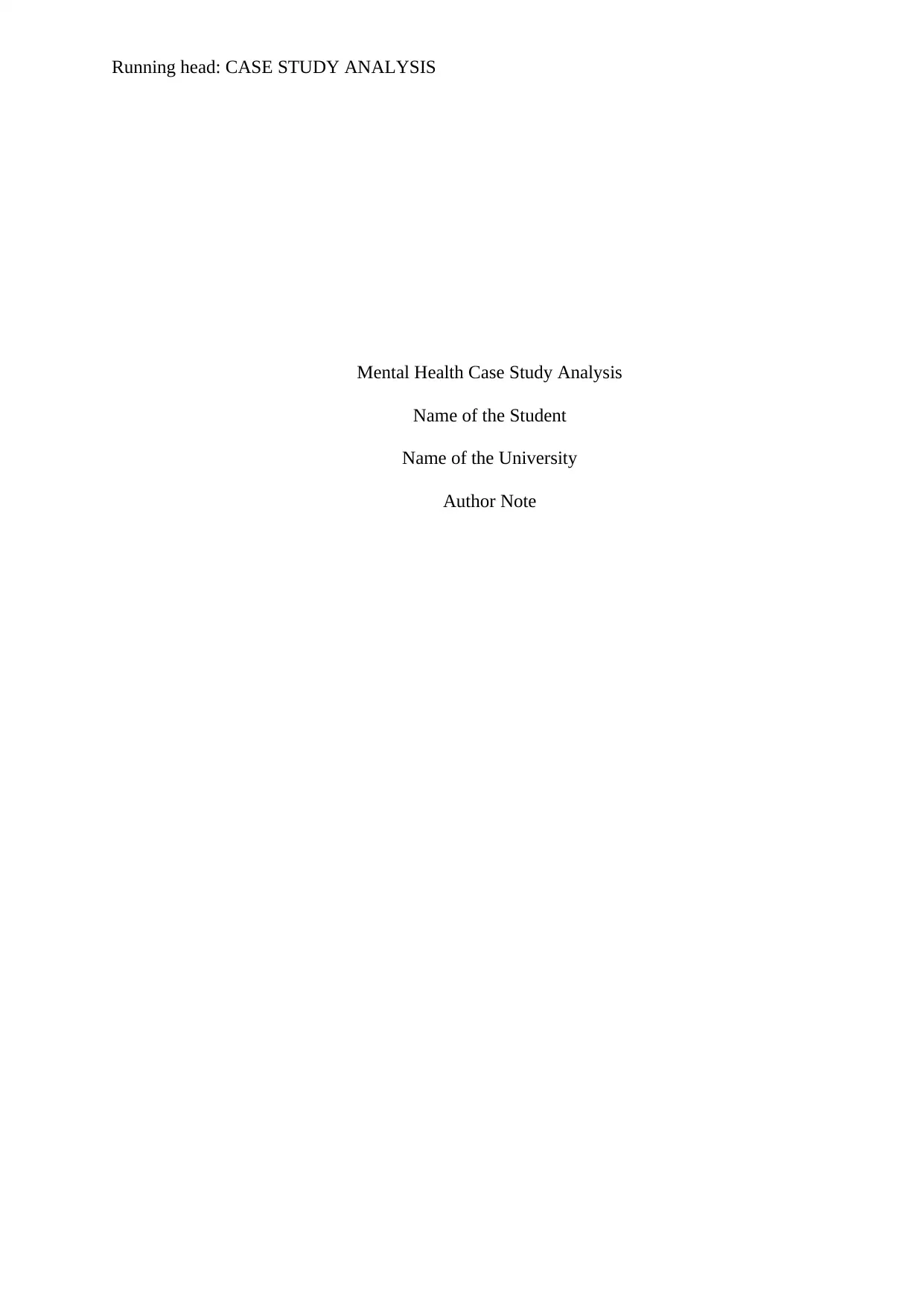
Running head: CASE STUDY ANALYSIS
Mental Health Case Study Analysis
Name of the Student
Name of the University
Author Note
Mental Health Case Study Analysis
Name of the Student
Name of the University
Author Note
Paraphrase This Document
Need a fresh take? Get an instant paraphrase of this document with our AI Paraphraser
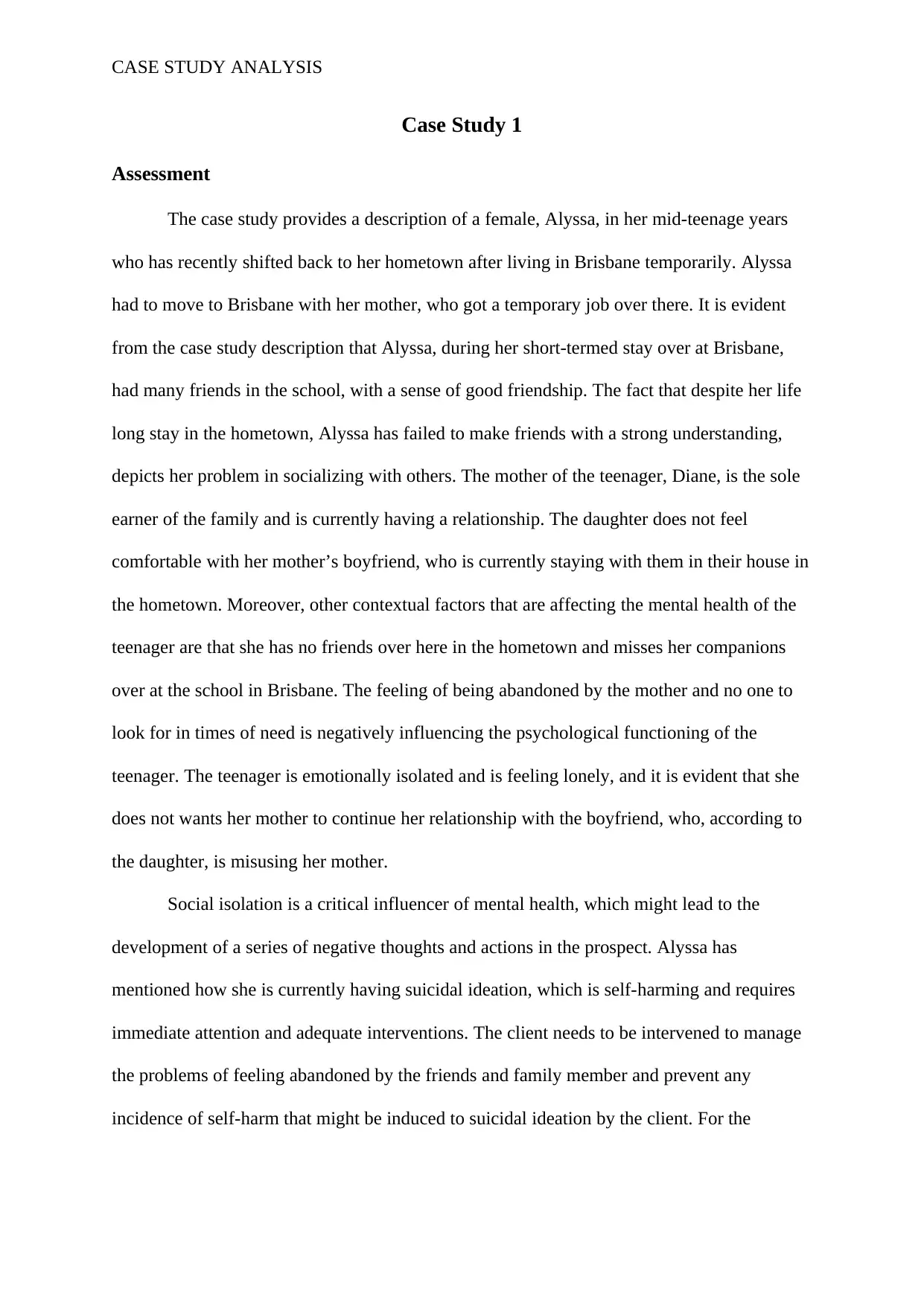
CASE STUDY ANALYSIS
Case Study 1
Assessment
The case study provides a description of a female, Alyssa, in her mid-teenage years
who has recently shifted back to her hometown after living in Brisbane temporarily. Alyssa
had to move to Brisbane with her mother, who got a temporary job over there. It is evident
from the case study description that Alyssa, during her short-termed stay over at Brisbane,
had many friends in the school, with a sense of good friendship. The fact that despite her life
long stay in the hometown, Alyssa has failed to make friends with a strong understanding,
depicts her problem in socializing with others. The mother of the teenager, Diane, is the sole
earner of the family and is currently having a relationship. The daughter does not feel
comfortable with her mother’s boyfriend, who is currently staying with them in their house in
the hometown. Moreover, other contextual factors that are affecting the mental health of the
teenager are that she has no friends over here in the hometown and misses her companions
over at the school in Brisbane. The feeling of being abandoned by the mother and no one to
look for in times of need is negatively influencing the psychological functioning of the
teenager. The teenager is emotionally isolated and is feeling lonely, and it is evident that she
does not wants her mother to continue her relationship with the boyfriend, who, according to
the daughter, is misusing her mother.
Social isolation is a critical influencer of mental health, which might lead to the
development of a series of negative thoughts and actions in the prospect. Alyssa has
mentioned how she is currently having suicidal ideation, which is self-harming and requires
immediate attention and adequate interventions. The client needs to be intervened to manage
the problems of feeling abandoned by the friends and family member and prevent any
incidence of self-harm that might be induced to suicidal ideation by the client. For the
Case Study 1
Assessment
The case study provides a description of a female, Alyssa, in her mid-teenage years
who has recently shifted back to her hometown after living in Brisbane temporarily. Alyssa
had to move to Brisbane with her mother, who got a temporary job over there. It is evident
from the case study description that Alyssa, during her short-termed stay over at Brisbane,
had many friends in the school, with a sense of good friendship. The fact that despite her life
long stay in the hometown, Alyssa has failed to make friends with a strong understanding,
depicts her problem in socializing with others. The mother of the teenager, Diane, is the sole
earner of the family and is currently having a relationship. The daughter does not feel
comfortable with her mother’s boyfriend, who is currently staying with them in their house in
the hometown. Moreover, other contextual factors that are affecting the mental health of the
teenager are that she has no friends over here in the hometown and misses her companions
over at the school in Brisbane. The feeling of being abandoned by the mother and no one to
look for in times of need is negatively influencing the psychological functioning of the
teenager. The teenager is emotionally isolated and is feeling lonely, and it is evident that she
does not wants her mother to continue her relationship with the boyfriend, who, according to
the daughter, is misusing her mother.
Social isolation is a critical influencer of mental health, which might lead to the
development of a series of negative thoughts and actions in the prospect. Alyssa has
mentioned how she is currently having suicidal ideation, which is self-harming and requires
immediate attention and adequate interventions. The client needs to be intervened to manage
the problems of feeling abandoned by the friends and family member and prevent any
incidence of self-harm that might be induced to suicidal ideation by the client. For the
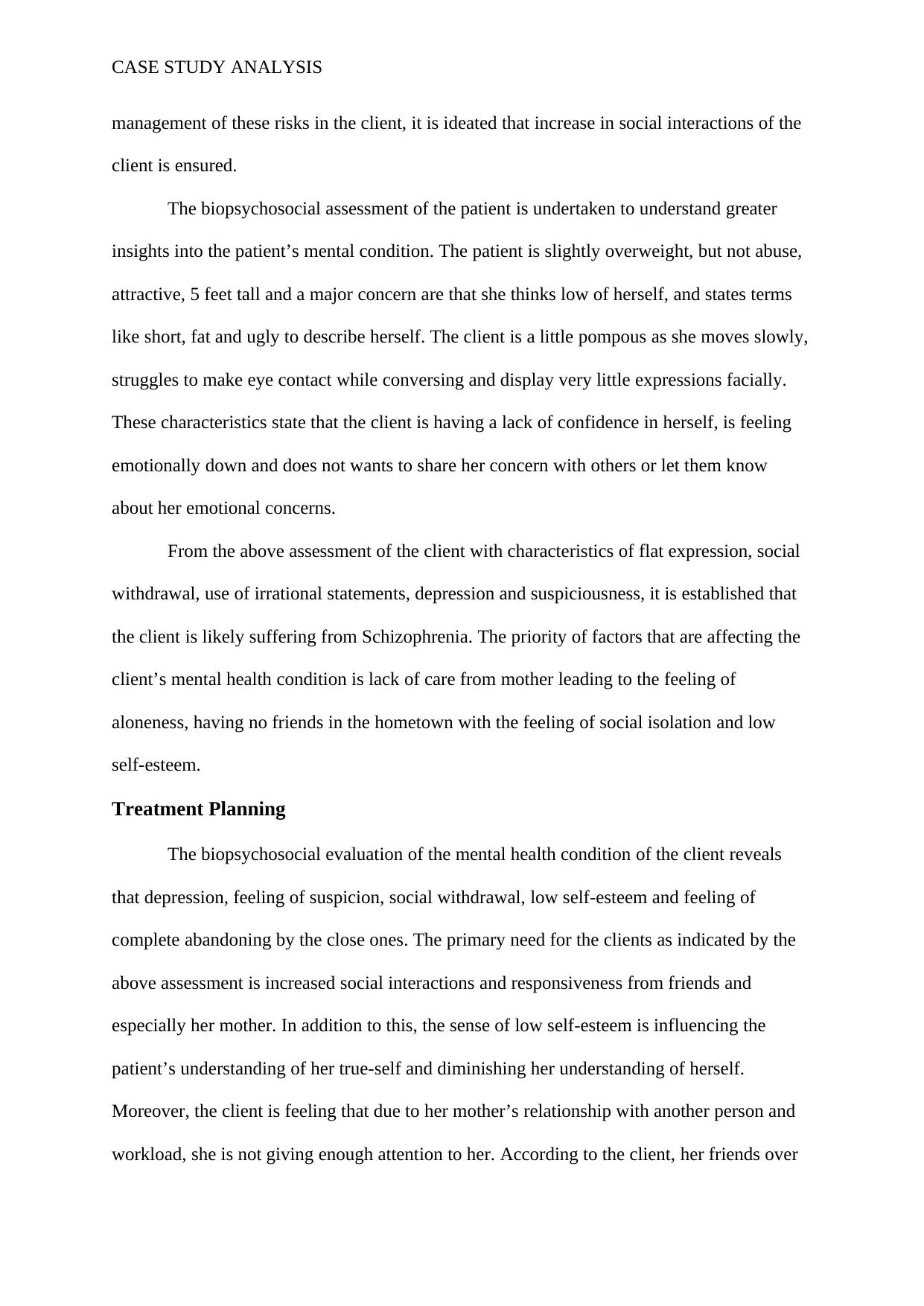
CASE STUDY ANALYSIS
management of these risks in the client, it is ideated that increase in social interactions of the
client is ensured.
The biopsychosocial assessment of the patient is undertaken to understand greater
insights into the patient’s mental condition. The patient is slightly overweight, but not abuse,
attractive, 5 feet tall and a major concern are that she thinks low of herself, and states terms
like short, fat and ugly to describe herself. The client is a little pompous as she moves slowly,
struggles to make eye contact while conversing and display very little expressions facially.
These characteristics state that the client is having a lack of confidence in herself, is feeling
emotionally down and does not wants to share her concern with others or let them know
about her emotional concerns.
From the above assessment of the client with characteristics of flat expression, social
withdrawal, use of irrational statements, depression and suspiciousness, it is established that
the client is likely suffering from Schizophrenia. The priority of factors that are affecting the
client’s mental health condition is lack of care from mother leading to the feeling of
aloneness, having no friends in the hometown with the feeling of social isolation and low
self-esteem.
Treatment Planning
The biopsychosocial evaluation of the mental health condition of the client reveals
that depression, feeling of suspicion, social withdrawal, low self-esteem and feeling of
complete abandoning by the close ones. The primary need for the clients as indicated by the
above assessment is increased social interactions and responsiveness from friends and
especially her mother. In addition to this, the sense of low self-esteem is influencing the
patient’s understanding of her true-self and diminishing her understanding of herself.
Moreover, the client is feeling that due to her mother’s relationship with another person and
workload, she is not giving enough attention to her. According to the client, her friends over
management of these risks in the client, it is ideated that increase in social interactions of the
client is ensured.
The biopsychosocial assessment of the patient is undertaken to understand greater
insights into the patient’s mental condition. The patient is slightly overweight, but not abuse,
attractive, 5 feet tall and a major concern are that she thinks low of herself, and states terms
like short, fat and ugly to describe herself. The client is a little pompous as she moves slowly,
struggles to make eye contact while conversing and display very little expressions facially.
These characteristics state that the client is having a lack of confidence in herself, is feeling
emotionally down and does not wants to share her concern with others or let them know
about her emotional concerns.
From the above assessment of the client with characteristics of flat expression, social
withdrawal, use of irrational statements, depression and suspiciousness, it is established that
the client is likely suffering from Schizophrenia. The priority of factors that are affecting the
client’s mental health condition is lack of care from mother leading to the feeling of
aloneness, having no friends in the hometown with the feeling of social isolation and low
self-esteem.
Treatment Planning
The biopsychosocial evaluation of the mental health condition of the client reveals
that depression, feeling of suspicion, social withdrawal, low self-esteem and feeling of
complete abandoning by the close ones. The primary need for the clients as indicated by the
above assessment is increased social interactions and responsiveness from friends and
especially her mother. In addition to this, the sense of low self-esteem is influencing the
patient’s understanding of her true-self and diminishing her understanding of herself.
Moreover, the client is feeling that due to her mother’s relationship with another person and
workload, she is not giving enough attention to her. According to the client, her friends over
⊘ This is a preview!⊘
Do you want full access?
Subscribe today to unlock all pages.

Trusted by 1+ million students worldwide
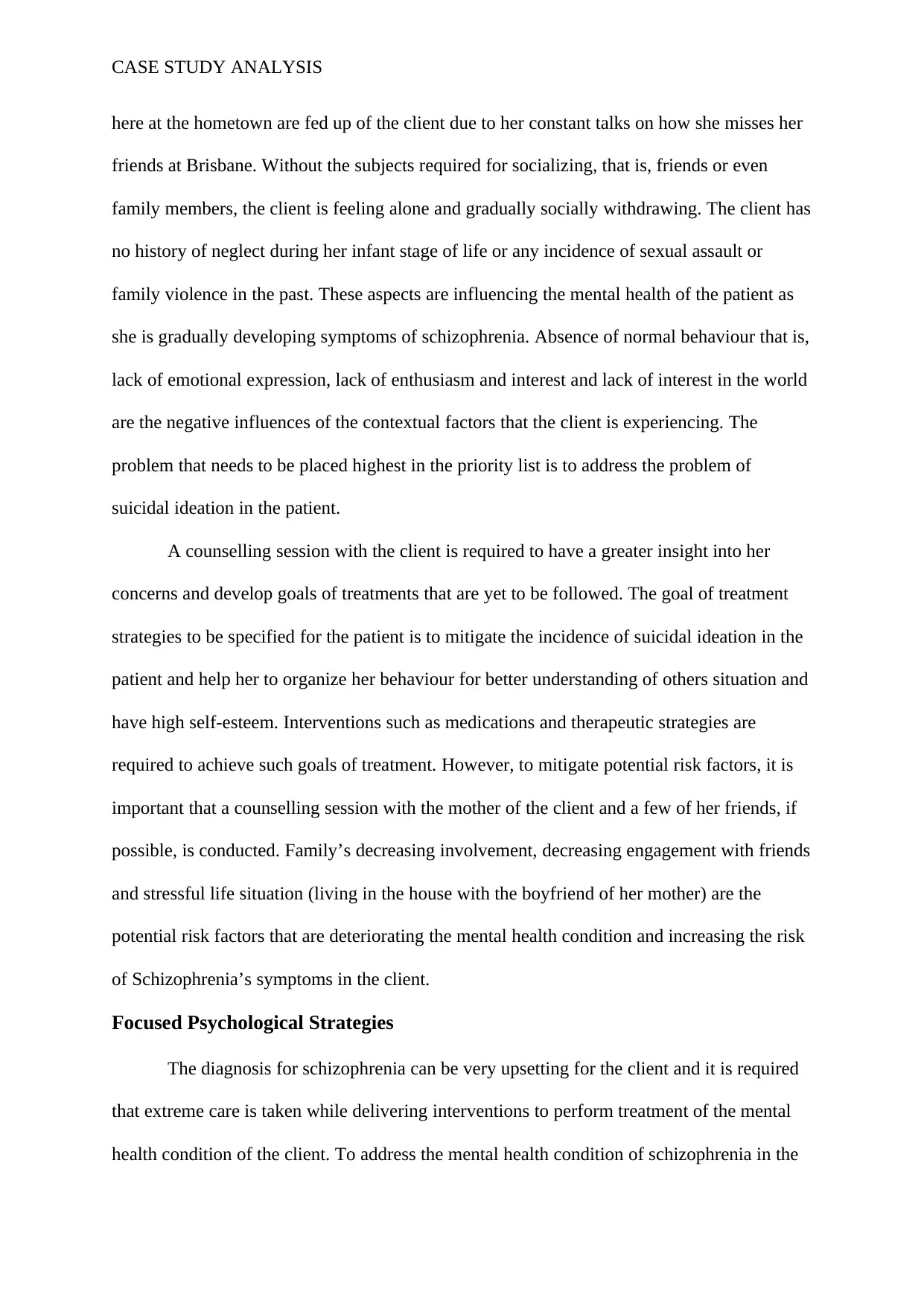
CASE STUDY ANALYSIS
here at the hometown are fed up of the client due to her constant talks on how she misses her
friends at Brisbane. Without the subjects required for socializing, that is, friends or even
family members, the client is feeling alone and gradually socially withdrawing. The client has
no history of neglect during her infant stage of life or any incidence of sexual assault or
family violence in the past. These aspects are influencing the mental health of the patient as
she is gradually developing symptoms of schizophrenia. Absence of normal behaviour that is,
lack of emotional expression, lack of enthusiasm and interest and lack of interest in the world
are the negative influences of the contextual factors that the client is experiencing. The
problem that needs to be placed highest in the priority list is to address the problem of
suicidal ideation in the patient.
A counselling session with the client is required to have a greater insight into her
concerns and develop goals of treatments that are yet to be followed. The goal of treatment
strategies to be specified for the patient is to mitigate the incidence of suicidal ideation in the
patient and help her to organize her behaviour for better understanding of others situation and
have high self-esteem. Interventions such as medications and therapeutic strategies are
required to achieve such goals of treatment. However, to mitigate potential risk factors, it is
important that a counselling session with the mother of the client and a few of her friends, if
possible, is conducted. Family’s decreasing involvement, decreasing engagement with friends
and stressful life situation (living in the house with the boyfriend of her mother) are the
potential risk factors that are deteriorating the mental health condition and increasing the risk
of Schizophrenia’s symptoms in the client.
Focused Psychological Strategies
The diagnosis for schizophrenia can be very upsetting for the client and it is required
that extreme care is taken while delivering interventions to perform treatment of the mental
health condition of the client. To address the mental health condition of schizophrenia in the
here at the hometown are fed up of the client due to her constant talks on how she misses her
friends at Brisbane. Without the subjects required for socializing, that is, friends or even
family members, the client is feeling alone and gradually socially withdrawing. The client has
no history of neglect during her infant stage of life or any incidence of sexual assault or
family violence in the past. These aspects are influencing the mental health of the patient as
she is gradually developing symptoms of schizophrenia. Absence of normal behaviour that is,
lack of emotional expression, lack of enthusiasm and interest and lack of interest in the world
are the negative influences of the contextual factors that the client is experiencing. The
problem that needs to be placed highest in the priority list is to address the problem of
suicidal ideation in the patient.
A counselling session with the client is required to have a greater insight into her
concerns and develop goals of treatments that are yet to be followed. The goal of treatment
strategies to be specified for the patient is to mitigate the incidence of suicidal ideation in the
patient and help her to organize her behaviour for better understanding of others situation and
have high self-esteem. Interventions such as medications and therapeutic strategies are
required to achieve such goals of treatment. However, to mitigate potential risk factors, it is
important that a counselling session with the mother of the client and a few of her friends, if
possible, is conducted. Family’s decreasing involvement, decreasing engagement with friends
and stressful life situation (living in the house with the boyfriend of her mother) are the
potential risk factors that are deteriorating the mental health condition and increasing the risk
of Schizophrenia’s symptoms in the client.
Focused Psychological Strategies
The diagnosis for schizophrenia can be very upsetting for the client and it is required
that extreme care is taken while delivering interventions to perform treatment of the mental
health condition of the client. To address the mental health condition of schizophrenia in the
Paraphrase This Document
Need a fresh take? Get an instant paraphrase of this document with our AI Paraphraser
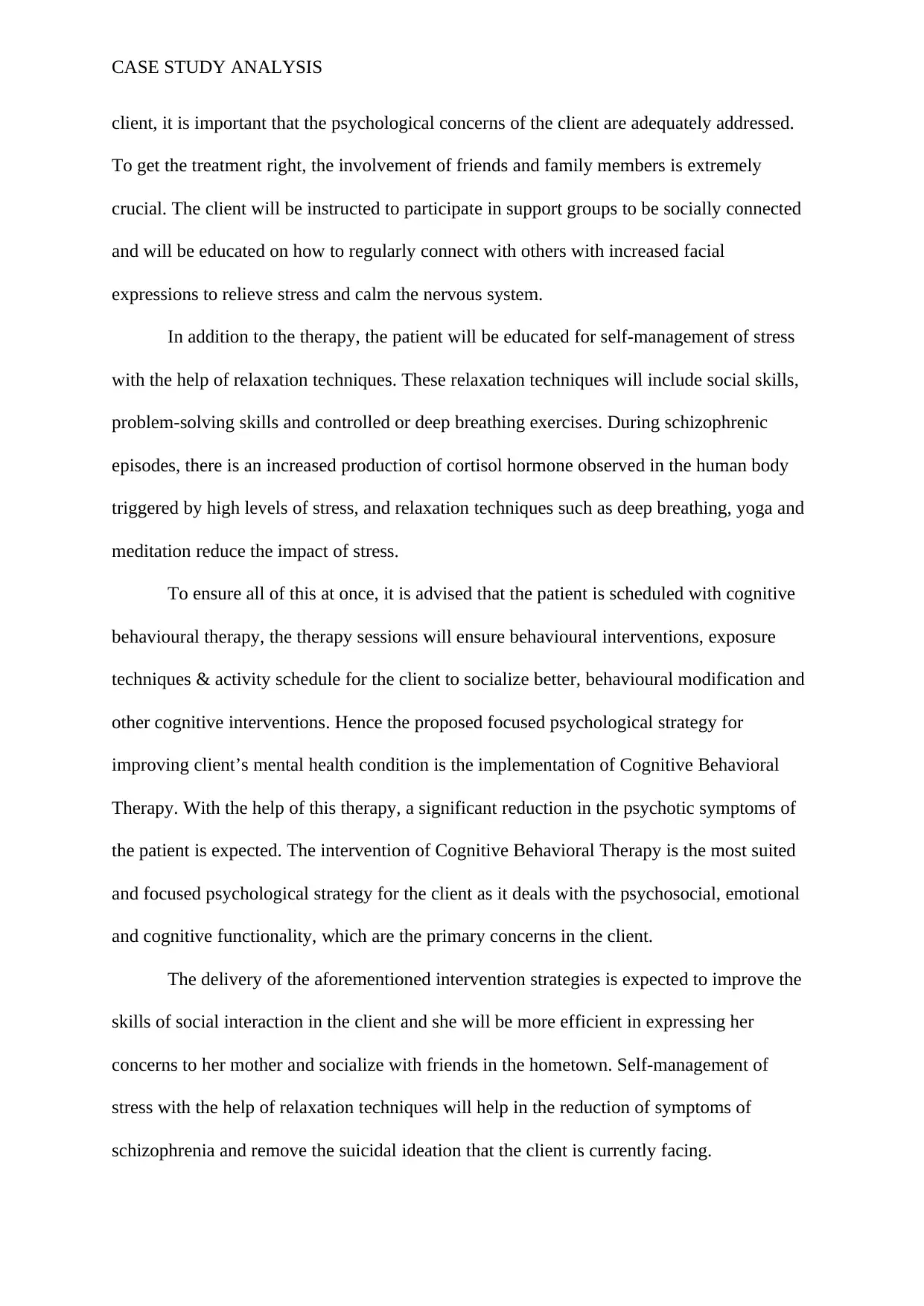
CASE STUDY ANALYSIS
client, it is important that the psychological concerns of the client are adequately addressed.
To get the treatment right, the involvement of friends and family members is extremely
crucial. The client will be instructed to participate in support groups to be socially connected
and will be educated on how to regularly connect with others with increased facial
expressions to relieve stress and calm the nervous system.
In addition to the therapy, the patient will be educated for self-management of stress
with the help of relaxation techniques. These relaxation techniques will include social skills,
problem-solving skills and controlled or deep breathing exercises. During schizophrenic
episodes, there is an increased production of cortisol hormone observed in the human body
triggered by high levels of stress, and relaxation techniques such as deep breathing, yoga and
meditation reduce the impact of stress.
To ensure all of this at once, it is advised that the patient is scheduled with cognitive
behavioural therapy, the therapy sessions will ensure behavioural interventions, exposure
techniques & activity schedule for the client to socialize better, behavioural modification and
other cognitive interventions. Hence the proposed focused psychological strategy for
improving client’s mental health condition is the implementation of Cognitive Behavioral
Therapy. With the help of this therapy, a significant reduction in the psychotic symptoms of
the patient is expected. The intervention of Cognitive Behavioral Therapy is the most suited
and focused psychological strategy for the client as it deals with the psychosocial, emotional
and cognitive functionality, which are the primary concerns in the client.
The delivery of the aforementioned intervention strategies is expected to improve the
skills of social interaction in the client and she will be more efficient in expressing her
concerns to her mother and socialize with friends in the hometown. Self-management of
stress with the help of relaxation techniques will help in the reduction of symptoms of
schizophrenia and remove the suicidal ideation that the client is currently facing.
client, it is important that the psychological concerns of the client are adequately addressed.
To get the treatment right, the involvement of friends and family members is extremely
crucial. The client will be instructed to participate in support groups to be socially connected
and will be educated on how to regularly connect with others with increased facial
expressions to relieve stress and calm the nervous system.
In addition to the therapy, the patient will be educated for self-management of stress
with the help of relaxation techniques. These relaxation techniques will include social skills,
problem-solving skills and controlled or deep breathing exercises. During schizophrenic
episodes, there is an increased production of cortisol hormone observed in the human body
triggered by high levels of stress, and relaxation techniques such as deep breathing, yoga and
meditation reduce the impact of stress.
To ensure all of this at once, it is advised that the patient is scheduled with cognitive
behavioural therapy, the therapy sessions will ensure behavioural interventions, exposure
techniques & activity schedule for the client to socialize better, behavioural modification and
other cognitive interventions. Hence the proposed focused psychological strategy for
improving client’s mental health condition is the implementation of Cognitive Behavioral
Therapy. With the help of this therapy, a significant reduction in the psychotic symptoms of
the patient is expected. The intervention of Cognitive Behavioral Therapy is the most suited
and focused psychological strategy for the client as it deals with the psychosocial, emotional
and cognitive functionality, which are the primary concerns in the client.
The delivery of the aforementioned intervention strategies is expected to improve the
skills of social interaction in the client and she will be more efficient in expressing her
concerns to her mother and socialize with friends in the hometown. Self-management of
stress with the help of relaxation techniques will help in the reduction of symptoms of
schizophrenia and remove the suicidal ideation that the client is currently facing.
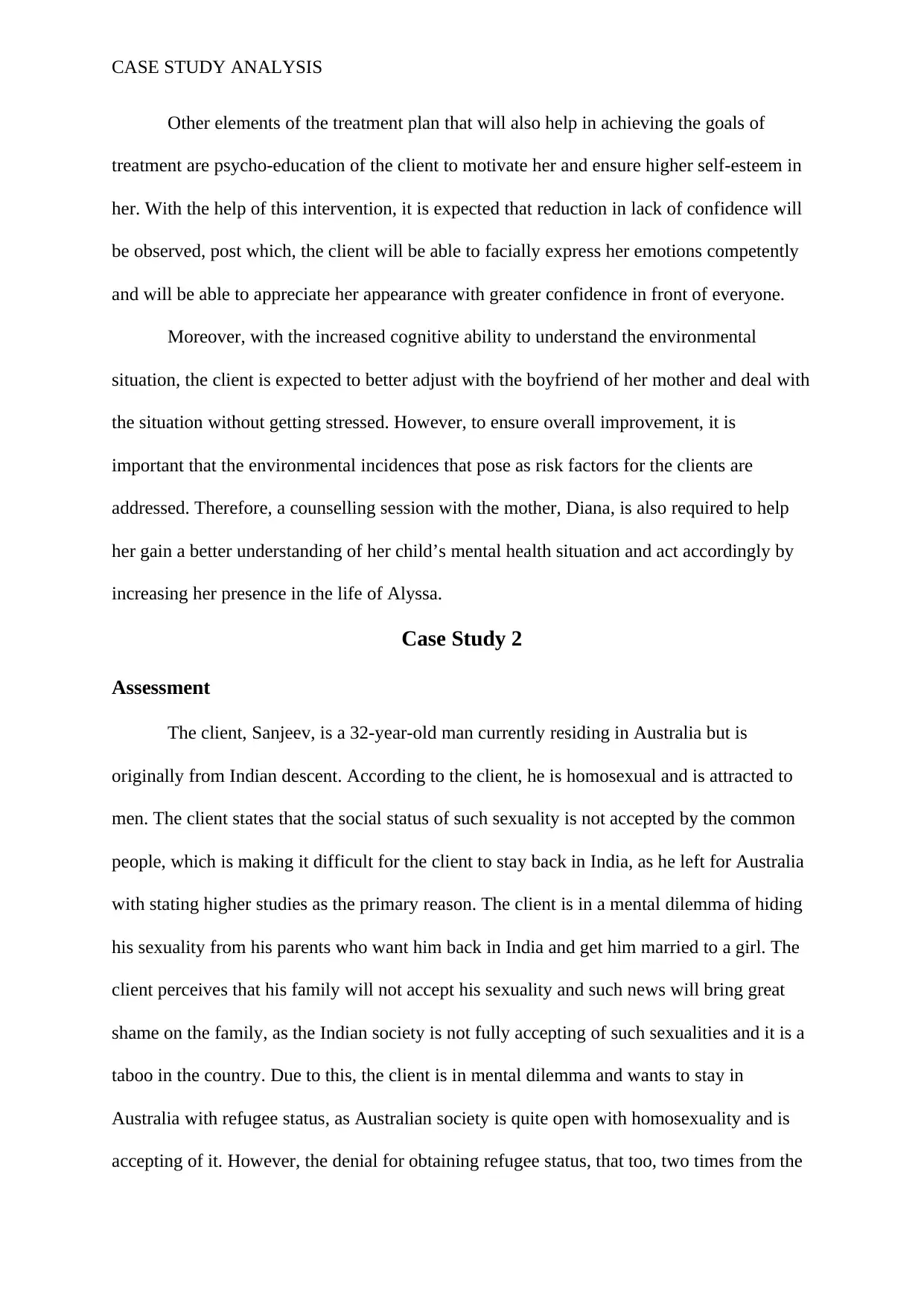
CASE STUDY ANALYSIS
Other elements of the treatment plan that will also help in achieving the goals of
treatment are psycho-education of the client to motivate her and ensure higher self-esteem in
her. With the help of this intervention, it is expected that reduction in lack of confidence will
be observed, post which, the client will be able to facially express her emotions competently
and will be able to appreciate her appearance with greater confidence in front of everyone.
Moreover, with the increased cognitive ability to understand the environmental
situation, the client is expected to better adjust with the boyfriend of her mother and deal with
the situation without getting stressed. However, to ensure overall improvement, it is
important that the environmental incidences that pose as risk factors for the clients are
addressed. Therefore, a counselling session with the mother, Diana, is also required to help
her gain a better understanding of her child’s mental health situation and act accordingly by
increasing her presence in the life of Alyssa.
Case Study 2
Assessment
The client, Sanjeev, is a 32-year-old man currently residing in Australia but is
originally from Indian descent. According to the client, he is homosexual and is attracted to
men. The client states that the social status of such sexuality is not accepted by the common
people, which is making it difficult for the client to stay back in India, as he left for Australia
with stating higher studies as the primary reason. The client is in a mental dilemma of hiding
his sexuality from his parents who want him back in India and get him married to a girl. The
client perceives that his family will not accept his sexuality and such news will bring great
shame on the family, as the Indian society is not fully accepting of such sexualities and it is a
taboo in the country. Due to this, the client is in mental dilemma and wants to stay in
Australia with refugee status, as Australian society is quite open with homosexuality and is
accepting of it. However, the denial for obtaining refugee status, that too, two times from the
Other elements of the treatment plan that will also help in achieving the goals of
treatment are psycho-education of the client to motivate her and ensure higher self-esteem in
her. With the help of this intervention, it is expected that reduction in lack of confidence will
be observed, post which, the client will be able to facially express her emotions competently
and will be able to appreciate her appearance with greater confidence in front of everyone.
Moreover, with the increased cognitive ability to understand the environmental
situation, the client is expected to better adjust with the boyfriend of her mother and deal with
the situation without getting stressed. However, to ensure overall improvement, it is
important that the environmental incidences that pose as risk factors for the clients are
addressed. Therefore, a counselling session with the mother, Diana, is also required to help
her gain a better understanding of her child’s mental health situation and act accordingly by
increasing her presence in the life of Alyssa.
Case Study 2
Assessment
The client, Sanjeev, is a 32-year-old man currently residing in Australia but is
originally from Indian descent. According to the client, he is homosexual and is attracted to
men. The client states that the social status of such sexuality is not accepted by the common
people, which is making it difficult for the client to stay back in India, as he left for Australia
with stating higher studies as the primary reason. The client is in a mental dilemma of hiding
his sexuality from his parents who want him back in India and get him married to a girl. The
client perceives that his family will not accept his sexuality and such news will bring great
shame on the family, as the Indian society is not fully accepting of such sexualities and it is a
taboo in the country. Due to this, the client is in mental dilemma and wants to stay in
Australia with refugee status, as Australian society is quite open with homosexuality and is
accepting of it. However, the denial for obtaining refugee status, that too, two times from the
⊘ This is a preview!⊘
Do you want full access?
Subscribe today to unlock all pages.

Trusted by 1+ million students worldwide
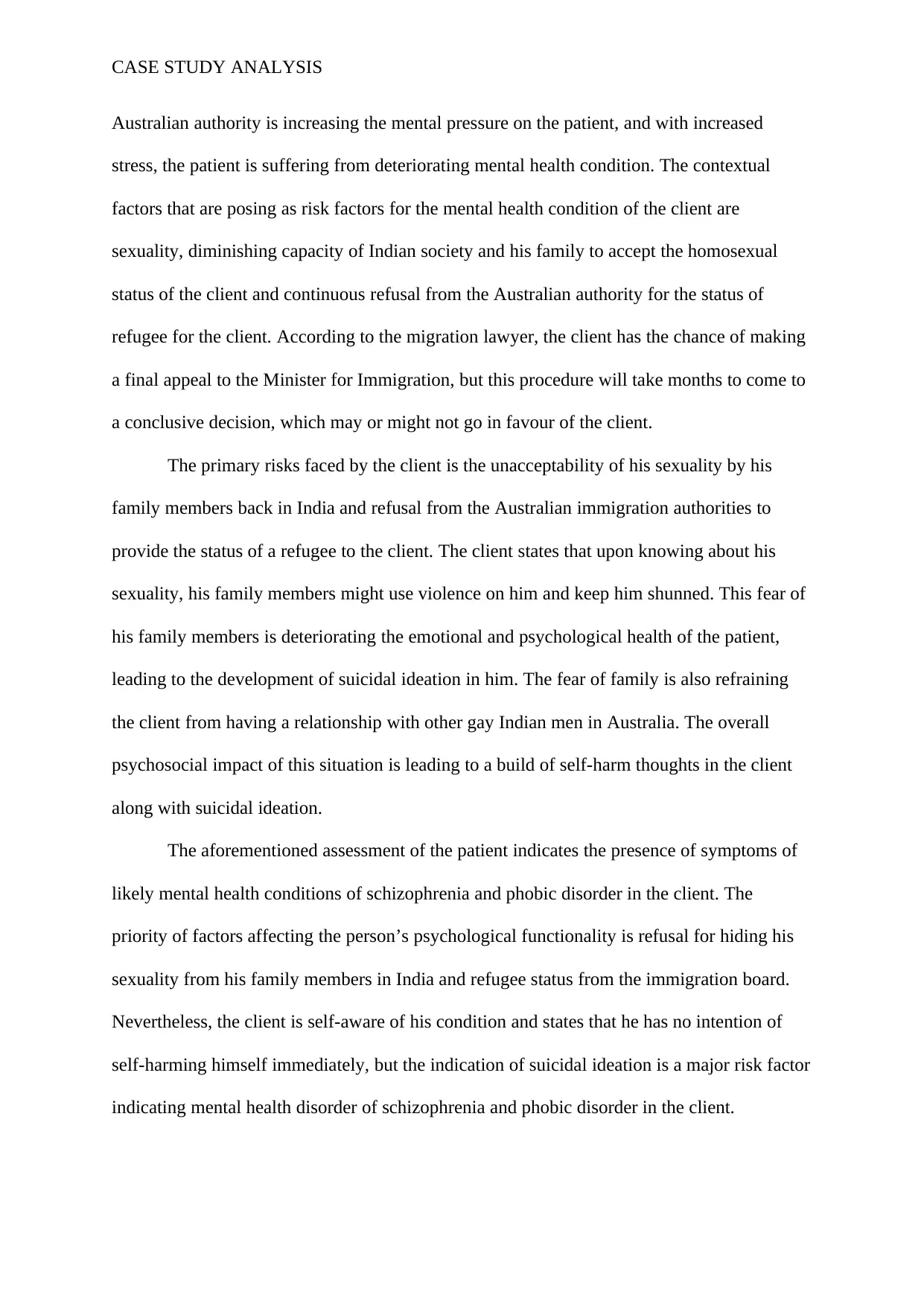
CASE STUDY ANALYSIS
Australian authority is increasing the mental pressure on the patient, and with increased
stress, the patient is suffering from deteriorating mental health condition. The contextual
factors that are posing as risk factors for the mental health condition of the client are
sexuality, diminishing capacity of Indian society and his family to accept the homosexual
status of the client and continuous refusal from the Australian authority for the status of
refugee for the client. According to the migration lawyer, the client has the chance of making
a final appeal to the Minister for Immigration, but this procedure will take months to come to
a conclusive decision, which may or might not go in favour of the client.
The primary risks faced by the client is the unacceptability of his sexuality by his
family members back in India and refusal from the Australian immigration authorities to
provide the status of a refugee to the client. The client states that upon knowing about his
sexuality, his family members might use violence on him and keep him shunned. This fear of
his family members is deteriorating the emotional and psychological health of the patient,
leading to the development of suicidal ideation in him. The fear of family is also refraining
the client from having a relationship with other gay Indian men in Australia. The overall
psychosocial impact of this situation is leading to a build of self-harm thoughts in the client
along with suicidal ideation.
The aforementioned assessment of the patient indicates the presence of symptoms of
likely mental health conditions of schizophrenia and phobic disorder in the client. The
priority of factors affecting the person’s psychological functionality is refusal for hiding his
sexuality from his family members in India and refugee status from the immigration board.
Nevertheless, the client is self-aware of his condition and states that he has no intention of
self-harming himself immediately, but the indication of suicidal ideation is a major risk factor
indicating mental health disorder of schizophrenia and phobic disorder in the client.
Australian authority is increasing the mental pressure on the patient, and with increased
stress, the patient is suffering from deteriorating mental health condition. The contextual
factors that are posing as risk factors for the mental health condition of the client are
sexuality, diminishing capacity of Indian society and his family to accept the homosexual
status of the client and continuous refusal from the Australian authority for the status of
refugee for the client. According to the migration lawyer, the client has the chance of making
a final appeal to the Minister for Immigration, but this procedure will take months to come to
a conclusive decision, which may or might not go in favour of the client.
The primary risks faced by the client is the unacceptability of his sexuality by his
family members back in India and refusal from the Australian immigration authorities to
provide the status of a refugee to the client. The client states that upon knowing about his
sexuality, his family members might use violence on him and keep him shunned. This fear of
his family members is deteriorating the emotional and psychological health of the patient,
leading to the development of suicidal ideation in him. The fear of family is also refraining
the client from having a relationship with other gay Indian men in Australia. The overall
psychosocial impact of this situation is leading to a build of self-harm thoughts in the client
along with suicidal ideation.
The aforementioned assessment of the patient indicates the presence of symptoms of
likely mental health conditions of schizophrenia and phobic disorder in the client. The
priority of factors affecting the person’s psychological functionality is refusal for hiding his
sexuality from his family members in India and refugee status from the immigration board.
Nevertheless, the client is self-aware of his condition and states that he has no intention of
self-harming himself immediately, but the indication of suicidal ideation is a major risk factor
indicating mental health disorder of schizophrenia and phobic disorder in the client.
Paraphrase This Document
Need a fresh take? Get an instant paraphrase of this document with our AI Paraphraser
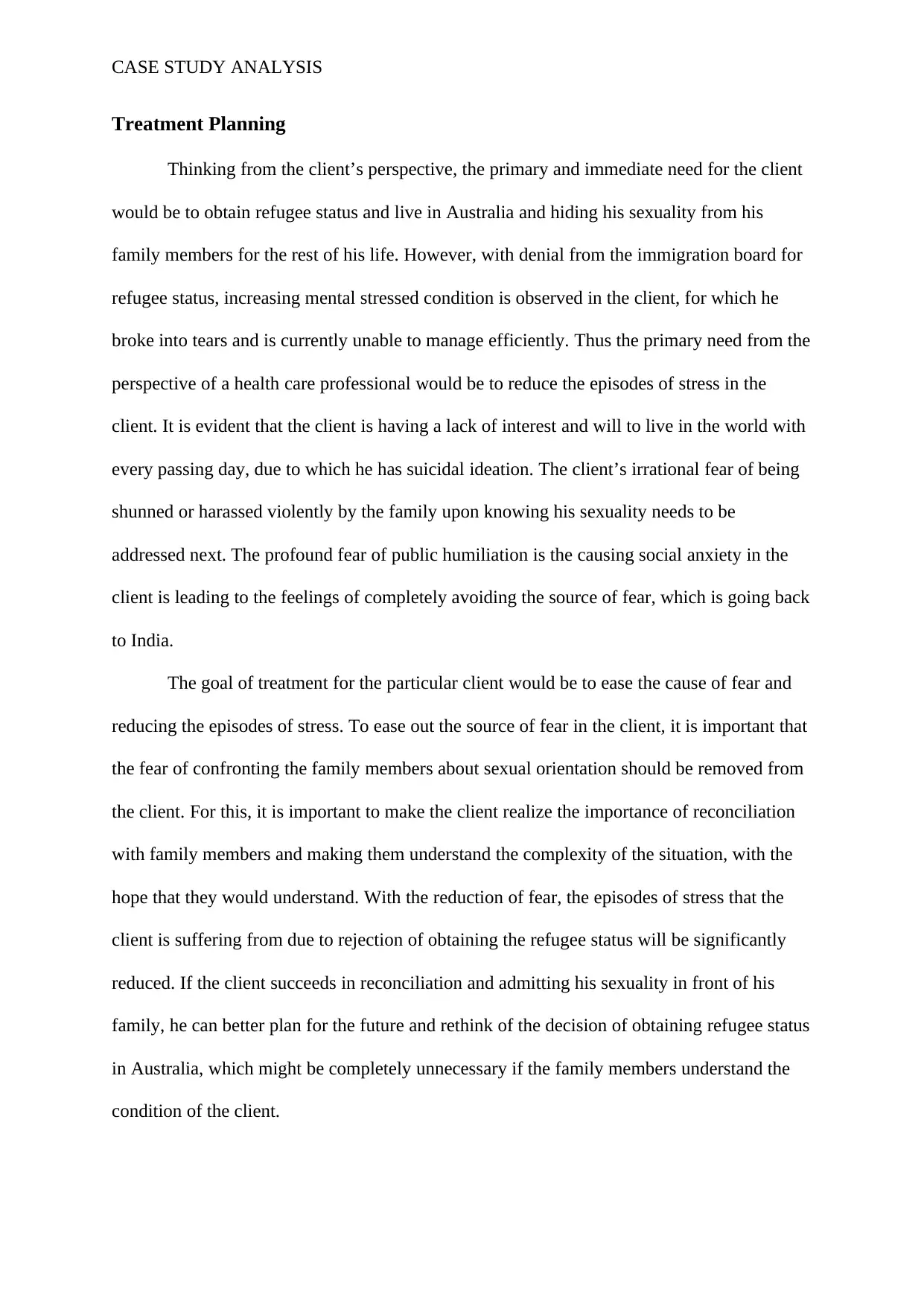
CASE STUDY ANALYSIS
Treatment Planning
Thinking from the client’s perspective, the primary and immediate need for the client
would be to obtain refugee status and live in Australia and hiding his sexuality from his
family members for the rest of his life. However, with denial from the immigration board for
refugee status, increasing mental stressed condition is observed in the client, for which he
broke into tears and is currently unable to manage efficiently. Thus the primary need from the
perspective of a health care professional would be to reduce the episodes of stress in the
client. It is evident that the client is having a lack of interest and will to live in the world with
every passing day, due to which he has suicidal ideation. The client’s irrational fear of being
shunned or harassed violently by the family upon knowing his sexuality needs to be
addressed next. The profound fear of public humiliation is the causing social anxiety in the
client is leading to the feelings of completely avoiding the source of fear, which is going back
to India.
The goal of treatment for the particular client would be to ease the cause of fear and
reducing the episodes of stress. To ease out the source of fear in the client, it is important that
the fear of confronting the family members about sexual orientation should be removed from
the client. For this, it is important to make the client realize the importance of reconciliation
with family members and making them understand the complexity of the situation, with the
hope that they would understand. With the reduction of fear, the episodes of stress that the
client is suffering from due to rejection of obtaining the refugee status will be significantly
reduced. If the client succeeds in reconciliation and admitting his sexuality in front of his
family, he can better plan for the future and rethink of the decision of obtaining refugee status
in Australia, which might be completely unnecessary if the family members understand the
condition of the client.
Treatment Planning
Thinking from the client’s perspective, the primary and immediate need for the client
would be to obtain refugee status and live in Australia and hiding his sexuality from his
family members for the rest of his life. However, with denial from the immigration board for
refugee status, increasing mental stressed condition is observed in the client, for which he
broke into tears and is currently unable to manage efficiently. Thus the primary need from the
perspective of a health care professional would be to reduce the episodes of stress in the
client. It is evident that the client is having a lack of interest and will to live in the world with
every passing day, due to which he has suicidal ideation. The client’s irrational fear of being
shunned or harassed violently by the family upon knowing his sexuality needs to be
addressed next. The profound fear of public humiliation is the causing social anxiety in the
client is leading to the feelings of completely avoiding the source of fear, which is going back
to India.
The goal of treatment for the particular client would be to ease the cause of fear and
reducing the episodes of stress. To ease out the source of fear in the client, it is important that
the fear of confronting the family members about sexual orientation should be removed from
the client. For this, it is important to make the client realize the importance of reconciliation
with family members and making them understand the complexity of the situation, with the
hope that they would understand. With the reduction of fear, the episodes of stress that the
client is suffering from due to rejection of obtaining the refugee status will be significantly
reduced. If the client succeeds in reconciliation and admitting his sexuality in front of his
family, he can better plan for the future and rethink of the decision of obtaining refugee status
in Australia, which might be completely unnecessary if the family members understand the
condition of the client.
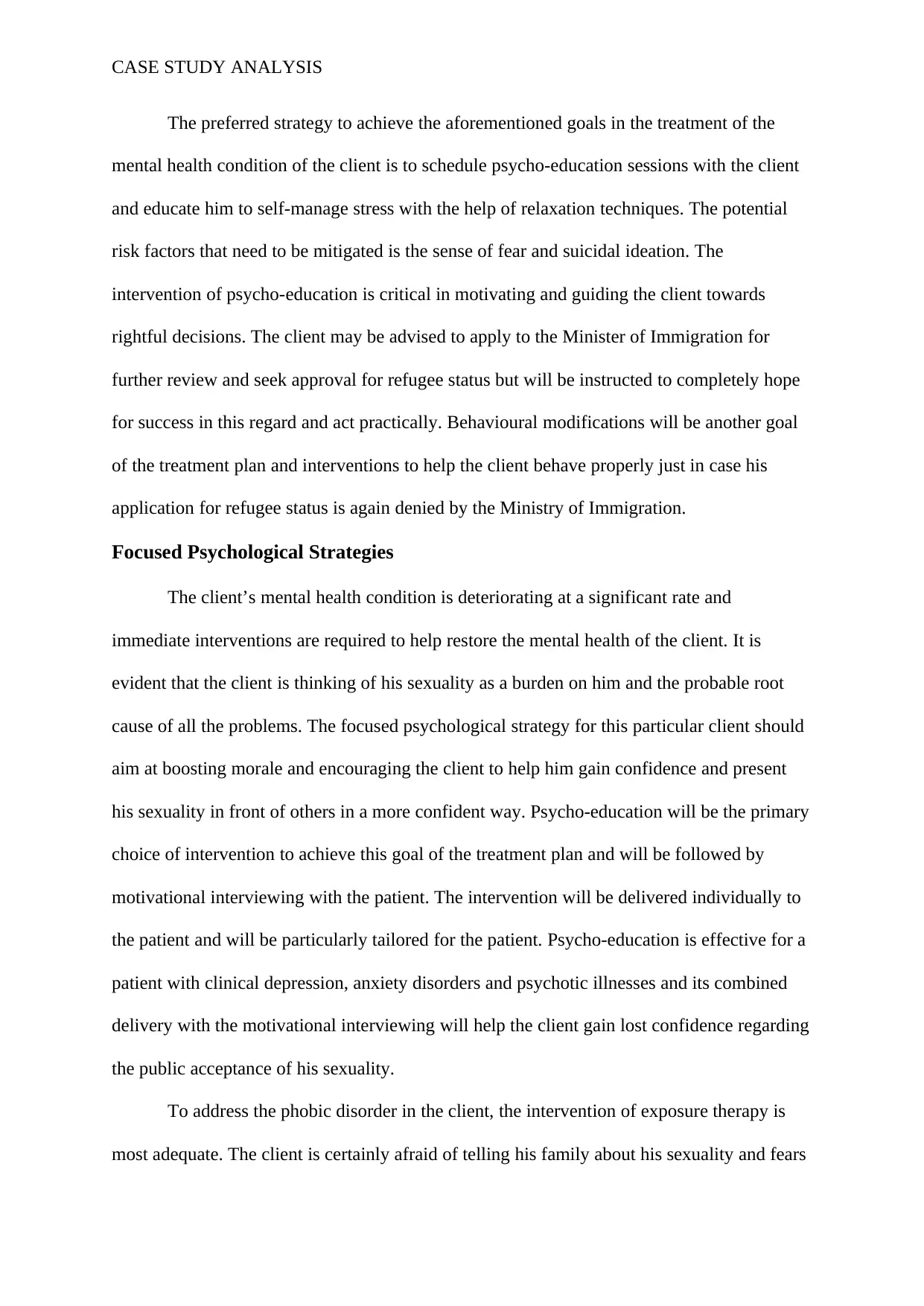
CASE STUDY ANALYSIS
The preferred strategy to achieve the aforementioned goals in the treatment of the
mental health condition of the client is to schedule psycho-education sessions with the client
and educate him to self-manage stress with the help of relaxation techniques. The potential
risk factors that need to be mitigated is the sense of fear and suicidal ideation. The
intervention of psycho-education is critical in motivating and guiding the client towards
rightful decisions. The client may be advised to apply to the Minister of Immigration for
further review and seek approval for refugee status but will be instructed to completely hope
for success in this regard and act practically. Behavioural modifications will be another goal
of the treatment plan and interventions to help the client behave properly just in case his
application for refugee status is again denied by the Ministry of Immigration.
Focused Psychological Strategies
The client’s mental health condition is deteriorating at a significant rate and
immediate interventions are required to help restore the mental health of the client. It is
evident that the client is thinking of his sexuality as a burden on him and the probable root
cause of all the problems. The focused psychological strategy for this particular client should
aim at boosting morale and encouraging the client to help him gain confidence and present
his sexuality in front of others in a more confident way. Psycho-education will be the primary
choice of intervention to achieve this goal of the treatment plan and will be followed by
motivational interviewing with the patient. The intervention will be delivered individually to
the patient and will be particularly tailored for the patient. Psycho-education is effective for a
patient with clinical depression, anxiety disorders and psychotic illnesses and its combined
delivery with the motivational interviewing will help the client gain lost confidence regarding
the public acceptance of his sexuality.
To address the phobic disorder in the client, the intervention of exposure therapy is
most adequate. The client is certainly afraid of telling his family about his sexuality and fears
The preferred strategy to achieve the aforementioned goals in the treatment of the
mental health condition of the client is to schedule psycho-education sessions with the client
and educate him to self-manage stress with the help of relaxation techniques. The potential
risk factors that need to be mitigated is the sense of fear and suicidal ideation. The
intervention of psycho-education is critical in motivating and guiding the client towards
rightful decisions. The client may be advised to apply to the Minister of Immigration for
further review and seek approval for refugee status but will be instructed to completely hope
for success in this regard and act practically. Behavioural modifications will be another goal
of the treatment plan and interventions to help the client behave properly just in case his
application for refugee status is again denied by the Ministry of Immigration.
Focused Psychological Strategies
The client’s mental health condition is deteriorating at a significant rate and
immediate interventions are required to help restore the mental health of the client. It is
evident that the client is thinking of his sexuality as a burden on him and the probable root
cause of all the problems. The focused psychological strategy for this particular client should
aim at boosting morale and encouraging the client to help him gain confidence and present
his sexuality in front of others in a more confident way. Psycho-education will be the primary
choice of intervention to achieve this goal of the treatment plan and will be followed by
motivational interviewing with the patient. The intervention will be delivered individually to
the patient and will be particularly tailored for the patient. Psycho-education is effective for a
patient with clinical depression, anxiety disorders and psychotic illnesses and its combined
delivery with the motivational interviewing will help the client gain lost confidence regarding
the public acceptance of his sexuality.
To address the phobic disorder in the client, the intervention of exposure therapy is
most adequate. The client is certainly afraid of telling his family about his sexuality and fears
⊘ This is a preview!⊘
Do you want full access?
Subscribe today to unlock all pages.

Trusted by 1+ million students worldwide
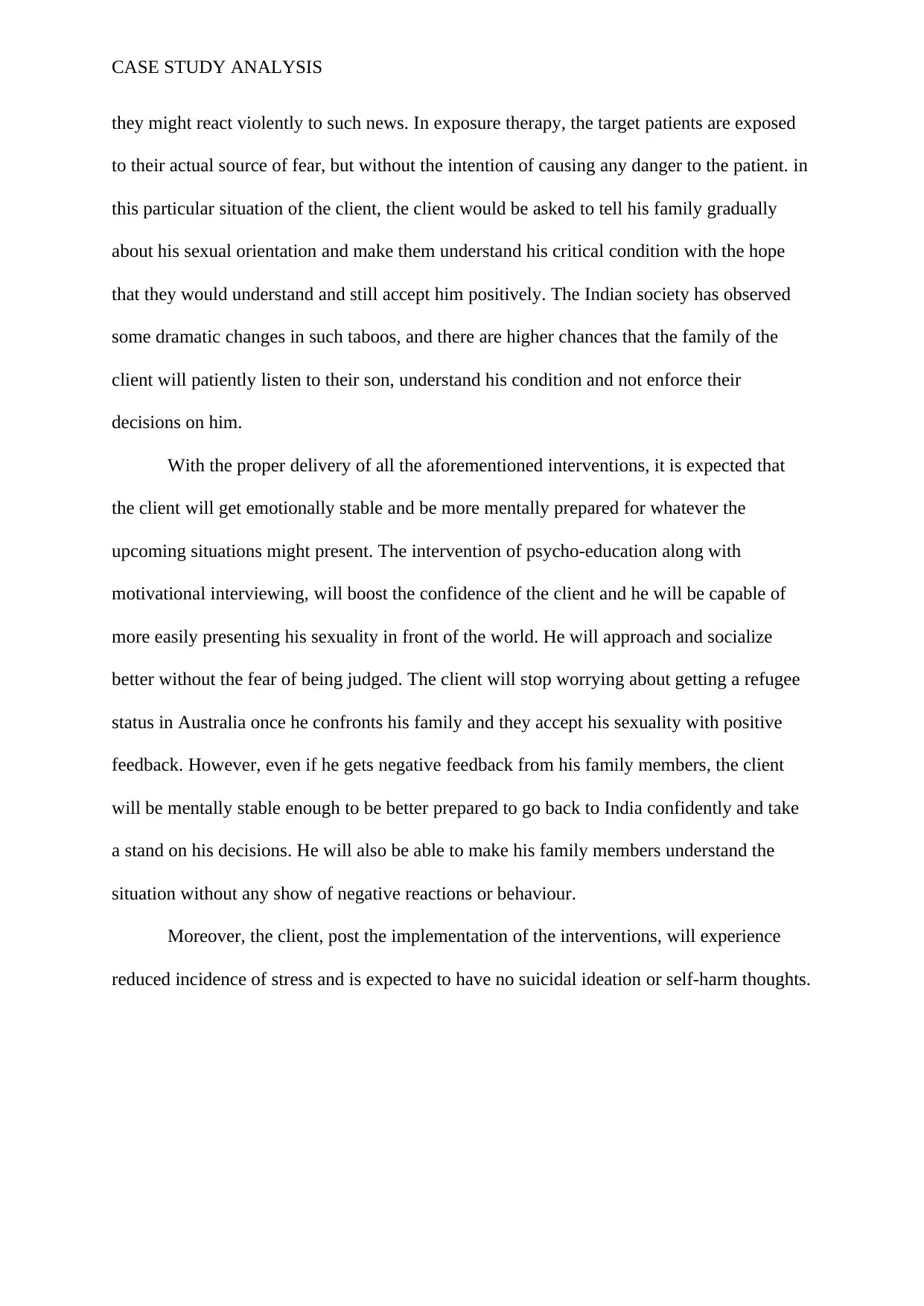
CASE STUDY ANALYSIS
they might react violently to such news. In exposure therapy, the target patients are exposed
to their actual source of fear, but without the intention of causing any danger to the patient. in
this particular situation of the client, the client would be asked to tell his family gradually
about his sexual orientation and make them understand his critical condition with the hope
that they would understand and still accept him positively. The Indian society has observed
some dramatic changes in such taboos, and there are higher chances that the family of the
client will patiently listen to their son, understand his condition and not enforce their
decisions on him.
With the proper delivery of all the aforementioned interventions, it is expected that
the client will get emotionally stable and be more mentally prepared for whatever the
upcoming situations might present. The intervention of psycho-education along with
motivational interviewing, will boost the confidence of the client and he will be capable of
more easily presenting his sexuality in front of the world. He will approach and socialize
better without the fear of being judged. The client will stop worrying about getting a refugee
status in Australia once he confronts his family and they accept his sexuality with positive
feedback. However, even if he gets negative feedback from his family members, the client
will be mentally stable enough to be better prepared to go back to India confidently and take
a stand on his decisions. He will also be able to make his family members understand the
situation without any show of negative reactions or behaviour.
Moreover, the client, post the implementation of the interventions, will experience
reduced incidence of stress and is expected to have no suicidal ideation or self-harm thoughts.
they might react violently to such news. In exposure therapy, the target patients are exposed
to their actual source of fear, but without the intention of causing any danger to the patient. in
this particular situation of the client, the client would be asked to tell his family gradually
about his sexual orientation and make them understand his critical condition with the hope
that they would understand and still accept him positively. The Indian society has observed
some dramatic changes in such taboos, and there are higher chances that the family of the
client will patiently listen to their son, understand his condition and not enforce their
decisions on him.
With the proper delivery of all the aforementioned interventions, it is expected that
the client will get emotionally stable and be more mentally prepared for whatever the
upcoming situations might present. The intervention of psycho-education along with
motivational interviewing, will boost the confidence of the client and he will be capable of
more easily presenting his sexuality in front of the world. He will approach and socialize
better without the fear of being judged. The client will stop worrying about getting a refugee
status in Australia once he confronts his family and they accept his sexuality with positive
feedback. However, even if he gets negative feedback from his family members, the client
will be mentally stable enough to be better prepared to go back to India confidently and take
a stand on his decisions. He will also be able to make his family members understand the
situation without any show of negative reactions or behaviour.
Moreover, the client, post the implementation of the interventions, will experience
reduced incidence of stress and is expected to have no suicidal ideation or self-harm thoughts.
1 out of 10
Related Documents
Your All-in-One AI-Powered Toolkit for Academic Success.
+13062052269
info@desklib.com
Available 24*7 on WhatsApp / Email
![[object Object]](/_next/static/media/star-bottom.7253800d.svg)
Unlock your academic potential
Copyright © 2020–2026 A2Z Services. All Rights Reserved. Developed and managed by ZUCOL.





